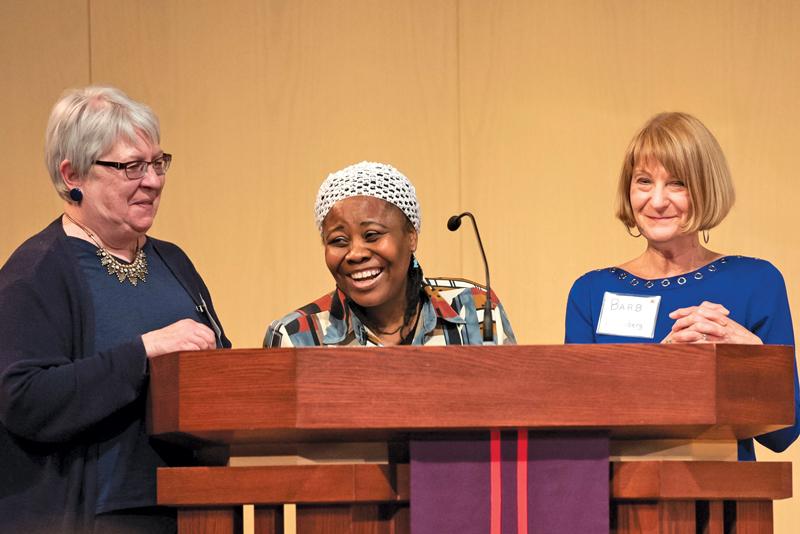That way, she’s not tempted to spend money she doesn’t have. Overspending caused her to lose her home in 2017, even though she was working three jobs at the time. Her girls went to live with their father, and she spent several months at the Staples Family Center shelter before finding subsidized housing in Ypsilanti. Shortly afterwards, her volunteer “ally” Pat Robertson says, “Robin found Circles, and we found Robin.”
Active in twenty-two states and Canada, Circles USA focuses on long-term solutions for reducing poverty. It recruits middle-class and upper-class volunteer “allies” to meet weekly with “leaders” like Robin. Staffer Bonita Bingham says they use that term, rather than “client,” because “the only person that’s going to be able to make that change for that family, for that person, is them.”
Circles was brought to Washtenaw County by Friends in Deed, which helps formerly homeless families get established in housing. After seeing some clients returning only a year or two later to again request donated furniture, the nonprofit began to look for ways to break the cycle of poverty. Bingham and coordinator Suzanne Van Dam were hired in 2016.
“We form intentional friendships between someone who’s in poverty and willing and able and motivated to get out of poverty,” Van Dam explains. “We match them with two or more allies … with the idea that by expanding their social network, they hear about jobs and opportunities through a wider social sphere that broadens their options.
“People need to feel safe to come to a place every week and talk about what it will take to get out of poverty, make sustainable plans, talk about money, and end their economic segregation by pairing with people outside their circle–ones with the time, experiences, and resources to help them free themselves from a crisis mode of living.”
Van Dam cites one Circles ally who went with a leader to renegotiate her debt. “He didn’t do the negotiating for her; he explained the process and they role-played before going to the meetings,” she says. That woman has since found a better job, greatly reduced her debt, and bought a house.
Another participant is a single mom with four kids under six, two with special needs, who’s trying to finish working toward a high school diploma: “Her biggest need is for a cheerleader, one without judgment,” Van Dam says. For such clients, “We have leaders that have recently come out of homelessness, who’d been living in their car or couch surfing.”
Circles is free for anyone eighteen or over whose income is no more than 185 percent of the federal poverty line ($12,490 for an individual and $25,750 for a family of four), and not in immediate crisis such as losing housing, a health crisis, or active addiction.
“You need to be someone who is sick and tired of being sick and tired,” Bingham says. “Someone who understands what they’re doing isn’t working and wants to change. Someone who knows things can be different, but doesn’t know how or where to start and just needs help and support to take that next step.”
Van Dam says it’s a two-way street: “Allies try to support them by acting as a sounding board, coach, researcher, advocate, and friend. Allies often say that they get much more out of the program than they put in!”
Volunteer Sue Stalker, also an ally of Robin, says she’s learned “about all the barriers of being in poverty and every time you try to do something, the hurdles that you have to go through just to get into the system. It’s been for me one of the most meaningful things I’ve ever done in my whole life.”
Robin says her family has also benefited: “My children see the big change in the way I do things and the way I think, financially and everything.”
“It’s hard to put an evaluation score on the peace of mind of reducing debt,” notes Van Dam. “You don’t have this terrible thing hanging over you, preventing you from taking a day off, spending time with your kids, going on a vacation, saving for school, and doing something you love with your life.”


